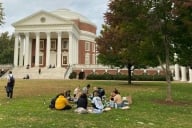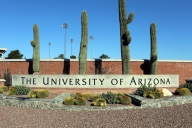You have /5 articles left.
Sign up for a free account or log in.
Faculty, community members, students and families arrived by snow machine, plane, or dog sled, or walked across frozen seas from surrounding villages. This is graduation in the Arctic at Chukchi campus, the northernmost branch in the University of Alaska System. Today, at commencement, it is a sunny and crisp 33 degrees. Younger residents don T-shirts and shorts.
Chukchi is situated in a place unimagined by most in higher education. The college, in Kotzebue, a settlement of 3,000 people, clings stubbornly to a gravel outcrop on the edge of the Chukchi Sea, where flat snow-covered tundra meets icy waters. Kotzebue is accessible by boat or air during three summer months; and by air, snow machine and sled in the winter.
Residents, students, and faculty live peacefully without ordinary facilities such as a dry cleaner, saloons, discos, or a car dealership. There are more snow machines and dogs than cars in Kotzebue. The town includes an airstrip for bush pilots. People headed to the landfill must pause for incoming and outgoing planes the way most students in America pause at a stop sign, looking for approaching vehicles. An itinerant hairdresser visits once each month and folks desiring a haircut schedule appointments. Only in late June and July are seagoing barges able to deliver gasoline. The price per gallon, nearly $6, remains until gas is delivered again this summer. Gas prices are expected to jump several dollars this July.
Life’s daily rituals and conveniences are all more extreme in the Arctic.
Kotzebue was founded in the late 1800s by the German Lt. Otto Von Kotzebue, sailing under the Russian flag. For 600 years the Inupiat Native occupied the area, trading ivory, baleen, various skins, wool, beads, bone tools and baskets with interior Natives and ocean visitors. As Russian traders and New England whalers introduced alcohol, firearms and disease during the 18th and 19th centuries, culture and commerce took a different turn.
Well-meaning missionaries, who endeavored to convince the “heathen” they were devil worshippers, also arrived. One legacy of exploration in the Arctic is, sadly, reflected in low rates of educational achievement for young men, and high rates of suicide, substance abuse and domestic violence, all problems that have been acknowledged by the elders and Alaska native leaders.
Graduation and commencement are celebratory as they are throughout the United States. There is great pride in finishing degrees. Chukchi campus also serves villages in the surrounding areas, through distance education programs. Students earn associate degrees, bachelor's and master's degrees.
The University of Alaska system is one of the few institutions that reaches inhabitants in rural and remote regions of the Arctic. UA scholars also engage in high-quality research on climate change, sustainable energy sources, high-latitude agriculture and in many other fields. On this day there are 20 hours of sunlight. Soon the sun will stay above the horizon for nearly a month; a far cry from winter, where, for a month or so, the suns rays rarely break the horizon, darkness prevails and temperatures sometimes drop to 100 degrees below zero. Residents are primarily Inupiat, joined by people of Asian, Siberian Yupik and Caucasian descent. Many are presently hunting waterfowl, seals and whales. For commencement, we are welcomed with muktuk, a specially cut section of whale blubber and skin -- a prized delicacy here.
On the graduation platform, as caribou meander outside, each graduate tells a story, each becoming a commencement speaker. Some depict amazing journeys through time and distance. Words are also spoken by students born into a U.S. territory, prior to Alaska statehood in 1959. There are palpable signs of relief and joy about obtaining degrees, even as the changing physical environment forebodes a warning more immediate than the tight job market.
Polar bears are moving south and inland in search of food, one apparent result of the shrinking sea ice. Tell the whale and walrus hunter that global warming is untrue or overstated and risk a reaction of confused or mournful anger. In the Arctic, the debate on climate change loses its polemical steam. Seas are opening, temperatures are rising, glaciers are retreating, villages and languages are disappearing. Whether present conditions result from anthropogenic influences, or Earth’s natural cycles, is of little consequence.
The graduation story at Chukchi is similar to what has occurred in America over the last 250 years. Alaska is the newest end point of an engaging American story. After all, Philadelphia, Boston and New York, like Kotzebue, were wilderness towns, claimed for their economic potential by European monarchs and the Dutch West India Company, the first multinational corporation. Resources were taken out of Colonial America; public policy was dictated by powerful external corporate entities.
The history of the U.S., like Alaska, has been a triumph of local control and self rule over benevolent outsiders. People came to Alaska to be free, to escape prejudice and conformity, to transcend the icy stares of those who admonish us to fit in and lament our lack of qualifications to do so. Others were brought as slaves. Indigenous peoples suffered tragically as history repeats itself.
Alaska today remains a place where dreams are made through hard work and second chances. Kotzebue itself is a town that encourages people to start anew, to conquer adversity, and to strike out in ways not normally accepted.
Which brings me to my topic this commencement; the triumph of the human spirit in extreme places. Extremes nourish the creative spirit. Indeed, extremes on the frontier underpin the most essential traits in the American character: restless inquisitiveness, exuberant confidence, a masterful grasp of the practical, pragmatism, an acute sense of destiny.
Through adaptation and resilience, we overcome personal and physical challenges. We change the future by changing ourselves in the present. An extreme place is the common denominator. Inevitably extreme places sustain different life styles, new businesses and ideas. Alaska is a creative place. I am certain this trait is linked to a highly competitive environment where life’s essentials, shelter, food and community are hard won and cannot be taken for granted.
Commencement at Chukchi represents the possibility of a new beginning. Life can be lonely and harsh, but it is precisely the juxtaposition of challenge, opportunity and freedom that draws us here. In extreme situations can we learn to live in harmony or test our potential as human beings.








